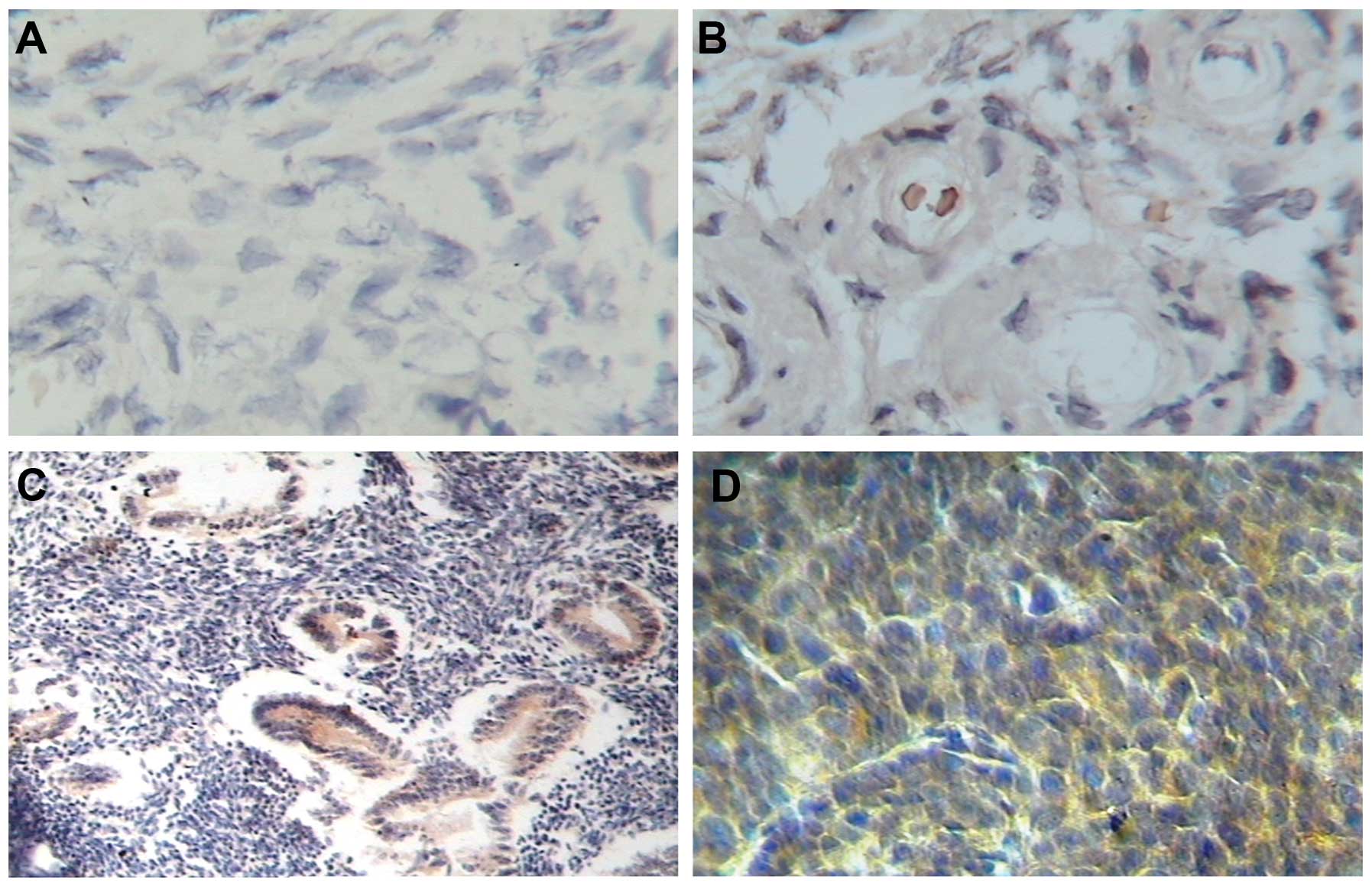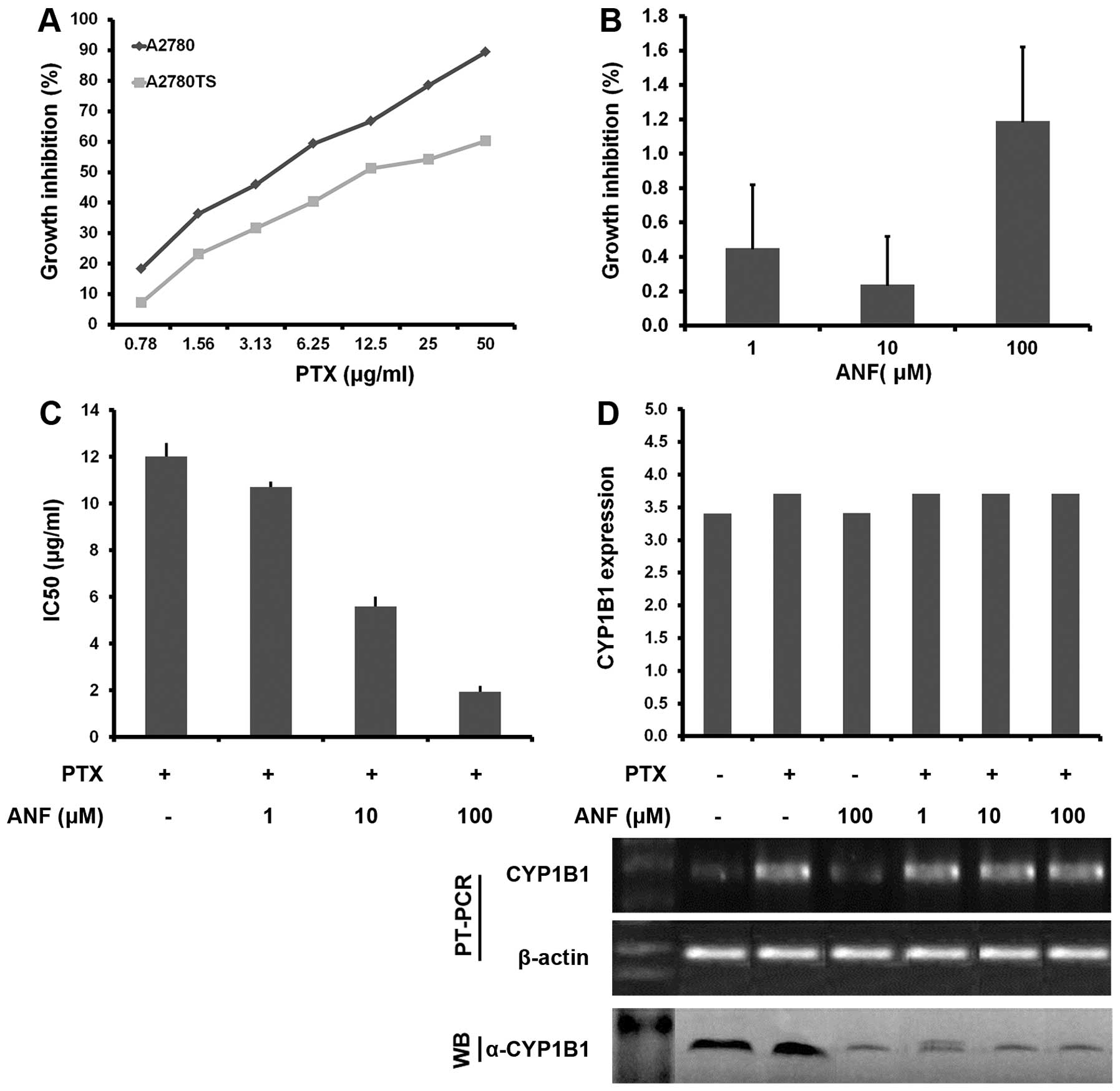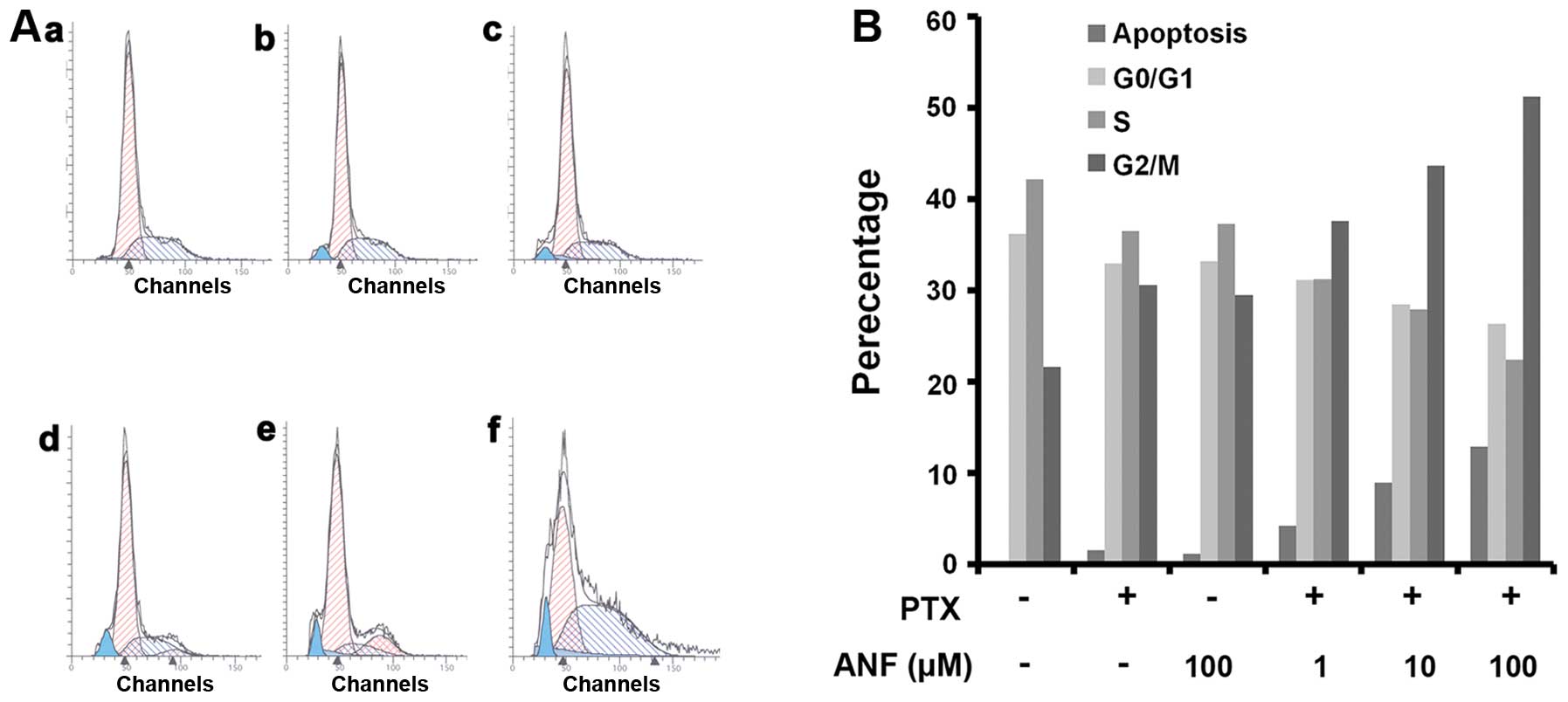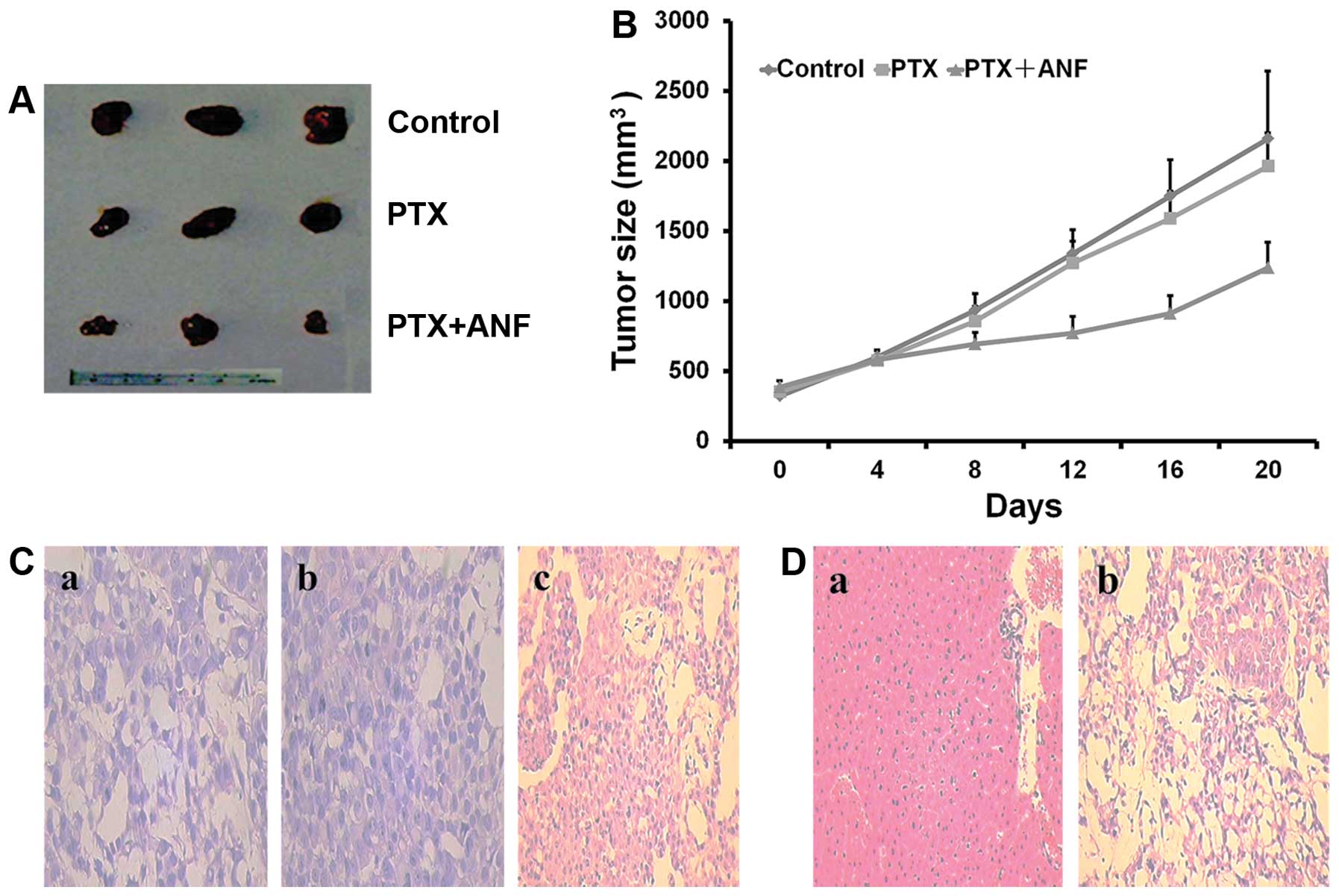|
1
|
American Cancer Society: Ovarian cancer.
https://www.cancer.org/acs/groups/cid/documents/webcontent/003130-pdf.pdf.
Accessed January 2, 2014.
|
|
2
|
Canevari S, Gariboldi M, Reid JF,
Bongarzone I and Pierotti MA: Molecular predictors of response and
outcome in ovarian cancer. J Gen Virol. 60:19–37. 2006.
|
|
3
|
Baldwin LA, Huang B, Miller RW, et al:
Ten-year relative survival for epithelial ovarian cancer. Obstet
Gynecol. 120:612–618. 2012. View Article : Google Scholar : PubMed/NCBI
|
|
4
|
Huang TC and Campbell TC: Comparison of
weekly versus every 3 weeks paclitaxel in the treatment of advanced
solid tumors: a meta-analysis. Cancer Treat Rev. 38:613–617. 2012.
View Article : Google Scholar
|
|
5
|
Mouratidou D, Gennatas C, Michalaki V, et
al: A phase III randomized study comparing paclitaxel and cisplatin
versus cyclophosphamide and cisplatin in patients with advanced
ovarian cancer. Anticancer Res. 27:681–685. 2007.PubMed/NCBI
|
|
6
|
Lewis DF: 57 varieties: the human
cytochromes P450. Pharmacogenomics. 5:305–318. 2004. View Article : Google Scholar : PubMed/NCBI
|
|
7
|
Nebert DW, Wikvall K and Miller WL: Human
cytochromes P450 in health and disease. Philos Trans R Soc Lond B
Biol Sci. 368:201204312013. View Article : Google Scholar : PubMed/NCBI
|
|
8
|
Fujita K: Cytochrome P450 and anticancer
drugs. Curr Drug Metab. 7:23–37. 2006. View Article : Google Scholar : PubMed/NCBI
|
|
9
|
Lynch T and Price A: The effect of
cytochrome P450 metabolism on drug response, interactions, and
adverse effects. Am Fam Physician. 76:391–396. 2007.PubMed/NCBI
|
|
10
|
Androutsopoulos VP, Spyrou I, Ploumidis A,
et al: Expression profile of CYP1A1 and CYP1B1 enzymes in colon and
bladder tumors. PloS One. 8:e824872013. View Article : Google Scholar : PubMed/NCBI
|
|
11
|
Murray GI, Melvin WT, Greenlee WF and
Burke MD: Regulation, function, and tissue-specific expression of
cytochrome P450 CYP1B1. Annu Rev Pharmacol Toxicol. 41:297–316.
2001. View Article : Google Scholar : PubMed/NCBI
|
|
12
|
Murray GI, Patimalla S, Stewart KN, Miller
ID and Heys SD: Profiling the expression of cytochrome P450 in
breast cancer. Histopathology. 57:202–211. 2010. View Article : Google Scholar : PubMed/NCBI
|
|
13
|
Piotrowska H, Kucinska M and Murias M:
Expression of CYP1A1, CYP1B1 and MnSOD in a panel of human cancer
cell lines. Mol Cell Biochem. 383:95–102. 2013. View Article : Google Scholar : PubMed/NCBI
|
|
14
|
Shatalova EG, Klein-Szanto AJ, Devarajan
K, Cukierman E and Clapper ML: Estrogen and cytochrome P450 1B1
contribute to both early- and late-stage head and neck
carcinogenesis. Cancer Prev Res (Phila). 4:107–115. 2011.
View Article : Google Scholar
|
|
15
|
Urbschat A, Paulus P, von Quernheim QF, et
al: Vitamin D hydroxylases CYP2R1, CYP27B1 and CYP24A1 in renal
cell carcinoma. Eur J Clin Invest. 43:1282–1290. 2013. View Article : Google Scholar : PubMed/NCBI
|
|
16
|
McFadyen MC, McLeod HL, Jackson FC, Melvin
WT, Doehmer J and Murray GI: Cytochrome P450 CYP1B1 protein
expression: a novel mechanism of anticancer drug resistance.
Biochem Pharmacol. 62:207–212. 2001. View Article : Google Scholar : PubMed/NCBI
|
|
17
|
Downie D, McFadyen MC, Rooney PH, et al:
Profiling cytochrome P450 expression in ovarian cancer:
identification of prognostic markers. Clin Cancer Res.
11:7369–7375. 2005. View Article : Google Scholar : PubMed/NCBI
|
|
18
|
Rochat B, Morsman JM, Murray GI, Figg WD
and McLeod HL: Human CYP1B1 and anticancer agent metabolism:
mechanism for tumor-specific drug inactivation? J Pharmacol Exp
Ther. 296:537–541. 2001.PubMed/NCBI
|
|
19
|
McFadyen MC, Cruickshank ME, Miller ID, et
al: Cytochrome P450 CYP1B1 over-expression in primary and
metastatic ovarian cancer. Br J Cancer. 85:242–246. 2001.
View Article : Google Scholar : PubMed/NCBI
|
|
20
|
Gibson P, Gill JH, Khan PA, et al:
Cytochrome P450 1B1 (CYP1B1) is overexpressed in human colon
adenocarcinomas relative to normal colon: implications for drug
development. Mol Cancer Ther. 2:527–534. 2003.PubMed/NCBI
|
|
21
|
McFadyen MC, Melvin WT and Murray GI:
Cytochrome P450 enzymes: novel options for cancer therapeutics. Mol
Cancer Ther. 3:363–371. 2004.PubMed/NCBI
|
|
22
|
Scripture CD, Sparreboom A and Figg WD:
Modulation of cytochrome P450 activity: implications for cancer
therapy. Lancet Oncol. 6:780–789. 2005. View Article : Google Scholar : PubMed/NCBI
|
|
23
|
Vaclavikova R, Soucek P, Svobodova L, et
al: Different in vitro metabolism of paclitaxel and docetaxel in
humans, rats, pigs, and minipigs. Drug Metab Dispos. 32:666–674.
2004. View Article : Google Scholar : PubMed/NCBI
|
|
24
|
Rochat B: Role of cytochrome P450 activity
in the fate of anticancer agents and in drug resistance: focus on
tamoxifen, paclitaxel and imatinib metabolism. Clin Pharmacokinet.
44:349–366. 2005. View Article : Google Scholar : PubMed/NCBI
|
|
25
|
Foland TB, Dentler WL, Suprenant KA, Gupta
ML Jr and Himes RH: Paclitaxel-induced microtubule stabilization
causes mitotic block and apoptotic-like cell death in a
paclitaxel-sensitive strain of Saccharomyces cerevisiae. Yeast.
22:971–978. 2005. View
Article : Google Scholar : PubMed/NCBI
|
|
26
|
Sun X, Li D, Yang Y, et al:
Microtubule-binding protein CLIP-170 is a mediator of paclitaxel
sensitivity. J Pathol. 226:666–673. 2012. View Article : Google Scholar
|
|
27
|
Marsh S, Somlo G, Li X, et al:
Pharmacogenetic analysis of paclitaxel transport and metabolism
genes in breast cancer. Pharmacogenomics J. 7:362–365. 2007.
View Article : Google Scholar : PubMed/NCBI
|
|
28
|
Bournique B and Lemarie A: Docetaxel
(Taxotere) is not metabolized by recombinant human CYP1B1 in vitro,
but acts as an effector of this isozyme. Drug Metab Dispos.
30:1149–1152. 2002. View Article : Google Scholar : PubMed/NCBI
|
|
29
|
Singh PB, Ragavan N, Ashton KM, Basu P,
Nadeem SM and Nicholson CM: Quantified gene expression levels for
phase I/II metabolizing enzyme and estrogen receptor levels in
benign prostate from cohorts designated as high-risk (UK) versus
low-risk (India) for adenocarcinoma at this organ site: a
preliminary study. Asian J Androl. 12:203–214. 2010. View Article : Google Scholar
|
|
30
|
Zahid M, Beseler CL, Hall JB, Levan T,
Cavalieri EL and Rogan EG: Unbalanced estrogen metabolism in
ovarian cancer. Int J Cancer. 134:2414–2423. 2013. View Article : Google Scholar : PubMed/NCBI
|
|
31
|
Piotrowska H, Myszkowski K, Ziolkowska A,
et al: Resveratrol analogue 3,4,4′,5-tetramethoxystilbene inhibits
growth, arrests cell cycle and induces apoptosis in ovarian SKOV-3
and A-2780 cancer cells. Toxicol Appl Pharmacol. 263:53–60. 2012.
View Article : Google Scholar : PubMed/NCBI
|
|
32
|
Saini S, Hirata H, Majid S and Dahiya R:
Functional significance of cytochrome P450 1B1 in endometrial
carcinogenesis. Cancer Res. 69:7038–7045. 2009. View Article : Google Scholar : PubMed/NCBI
|
|
33
|
Huang Y and Fan W: IkappaB kinase
activation is involved in regulation of paclitaxel-induced
apoptosis in human tumor cell lines. Mol Pharmacol. 61:105–113.
2002. View Article : Google Scholar
|
|
34
|
Qiu B, Sun X, Zhang D, Wang Y, Tao J and
Ou S: TRAIL and paclitaxel synergize to kill U87 cells and
U87-derived stem-like cells in vitro. Int J Mol Sci. 13:9142–9156.
2012. View Article : Google Scholar : PubMed/NCBI
|



















